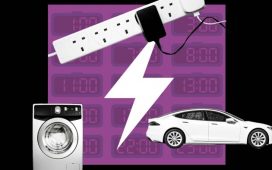The energy regulator’s remit must be updated to reflect the UK’s legally binding net zero target, a government-commissioned report has recommended, as it warned that under-investment in the nation’s grid infrastructure was becoming a “significant brake” on the economy.
The government’s first “offshore wind champion”, Tim Pick, who was appointed last year, concluded that Ofgem’s powers should be changed in order to “give proper weight” to the 2050 net zero target.
The proposed expansion of the regulator’s short-term focus to “a longer-term view”, including the goal of decarbonising the power system by 2035, echoed the recommendations by Downing Street’s net zero tsar, Chris Skidmore, in January.
Energy secretary Grant Shapps said the government would “carefully consider the recommendations” by Pick published on Wednesday, just days after ministers had rejected Skidmore’s proposals to update Ofgem’s remit, stating they “did not believe that it is necessary” to incorporate the net zero target.
Pick’s report said there was also an urgent need to upgrade the UK’s grid infrastructure and speed up the approval of renewable energy projects. The need to modernise the UK’s power networks, which were designed for legacy fossil fuel generation, is a challenge facing developed countries worldwide.
The solar and wind power industries in the UK have warned that under-investment in the grid and the slow planning system were drags on the rollout of renewables.
Last month, the National Audit Office, the UK’s public spending watchdog, said the government risked failing to meet its goal of decarbonising the power sector by 2035 due to the lack of a delivery plan.
Pick’s report said grid access constraints were “becoming a significant brake on wider economic activity”, and that the difficulty of connecting new renewables projects to the network was “increasingly becoming the rate-limiting factor” for the rollout of new offshore wind farms.
Since the UK’s power network was privatised in the 1990s, only around 50km of new transmission lines had been built each year on average, it said.
Long waiting times for the approval of new renewable energy projects have also weighed on the wind industry in the UK, with the EU facing similar problems. About 600 battery, wind and solar projects in England and Wales were waiting to connect to the grid in February.
UK and EU lawmakers have pledged to speed up the process after Russia weaponised energy supplies as part of its full-scale invasion of Ukraine last year. The report said that the timeline for applications in the UK had “ballooned”, and took “significantly” longer than the statutory timeframe of 18 months. No offshore wind application had been approved within the timeframe since January 2019, it found.
The skills and funding of England’s planning inspectorate had also “not kept pace” with the growing number and complexity of offshore wind applications.
Ofgem, which regulates how much companies can charge consumers to make improvements to the grid based on five yearly cycles, had a key role to play, Pick concluded
The watchdog’s focus on keeping consumer bills low in the short term should change to a more strategic approach. Its broader remit should include powers to allow it to approve investments in grid infrastructure needed to reach net zero and other key milestones, such as the government’s aim of decarbonising the power system by 2035, it recommended.









